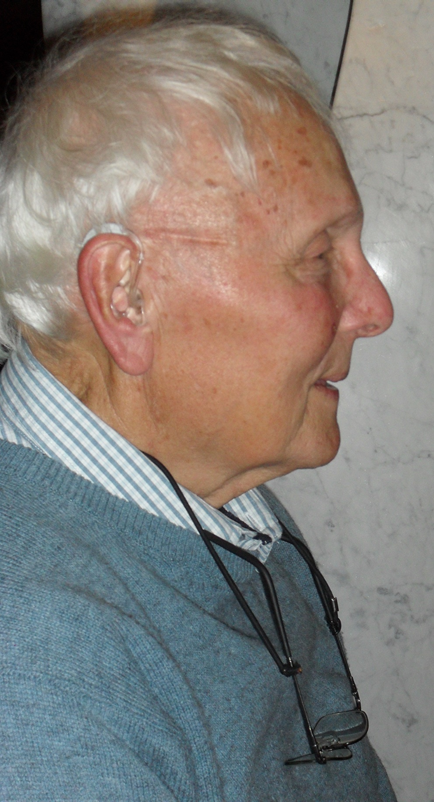
‘Waldo’s Religion’ was Emyr Llewelyn’s chosen topic on the occasion of the ninth Annual Cymdeithas Waldo Lecture at Oriel y Parc, St Davids on Friday, September 27. It was Emyr who also delivered the inaugural lecture at Capel Bethel, Mynachlog-ddu, when he dissected ‘Tŷ Ddewi’, Waldo’s ode to St Davids.
On this occasion he compared the similar rural backgrounds in which Jesus Christ was brought up in Nazareth and Waldo in the Preselau and came to the conclusion that Waldo was a true disciple of the Jew as he also wanted to turn the world upside down.
Both were brought up amongst ordinary peasants and both were aware of the symbols of oppression. From his home Jesus could see the Roman fort Sapphorus and Waldo could see the Norman tower at Roch in the distance. Whilst Jesus frequented a synagogue Waldo frequented a chapel where he heard psalms and hymns and prayers and became accustomed to matters of the spirit.
Emyr suggested the poem ‘Preseli’ as a description of the civilised community in which Waldo found himself reflected the paintings of such artists as Millet and Monet when they portrayed peasants in their double ‘they wrestle with the earth and the sky . . .’.
‘Wedded to wind and rain and mist and sackcloths’ was Waldo’s earliest version of the preceding line as the sack would keep the peasants dry as they ‘toss the sun to their children as still they bend’. The meaning of which was that was their way of passing on their values from generation to generation.
Jesus did not accept the teachings of the synagogue without querying and similarly Waldo did not accept the standards of the Nonconformist chapels without querying. He had studied all the Eastern religions and wrote a hymn when he was 17 years of age but all the same Emyr quoted several of Waldo’s earlier poems which questioned the Nonconformist setup.
‘Piclo Gweledigaeth’ (Pickling a Vision) is as much a condemnation of Apostle Paul as it is of orthodox preachers. And the poem ‘Yn Gymaint . . .’ (As much as . . .) is also as much a condemnation of religious orders who ignore the needs of children forced to dream of comforts in their sleep as they have none when they are awake.
As background the lecturer said Waldo was very much aware the Christian religion had been corrupted once it was adopted by the Roman Empire and used to justify wars much against the teachings of Jesus. And the fact that Waldo did not believe a state should profess Christianity unless it renounces militarism was what drove him to join the Quakers.
Quakers believe that wars cannot be justified under any circumstances. They do not have preachers in their services. Profound silence is the norm rather than eloquence. Emphasis is placed on practical Christianity and Emyr gave several examples of Waldo’s practical Christianity.
He would spend Sunday evenings visiting a blind Quaker; for a while he visited a friend twice a week endeavouring to persuade him to give up alcohol too which he had become a slave; he would visit a gypsy family in their caravan near Goodwick bearing gifts of two oranges to the son, and when one of his nephews confided he had lost his faith he did not chastise him but encouraged him to find God in nature or in man’s relationship with man.
When he taught in church schools he would refuse to recite the Catechism citing that he ‘would rather be lost by the truth than saved by a bag of tricks’. Too Waldo God could be seen in the personality of the destitute and the unprivileged. Too him the power of the spirit was to be found in the rock at Plumstone rather than in a tower built by man. Similarly Christ offered himself as a rock. Waldo saw Christianity in his mother’s personality.
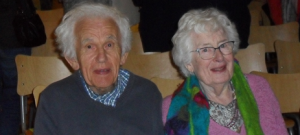
Above: Two Quakers in the audience who knew Waldo well – David Redpath and his wife Margaret
Earlier Emyr Llewelyn launched a new edition of ‘Cerddi’r Plant’, a volume of children’s poetry written by Waldo and E. Llwyd Williams. He emphasised we should not be deceived by the simplicity of many of the poems. ‘Pitran Pitran’, for example, in its reference to the rain falling on the roofs of the homes of people of all backgrounds affirms Waldo’s belief that humanity has no divisions. Emyr added that writing those poems proved to be a catharsis for Waldo as he re-lived his own childhood and re-lived the loss he felt with the death of his older sister, Morvydd.
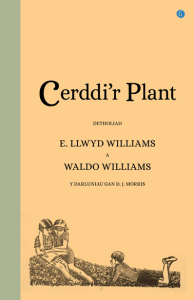
Above: The latest edition of Cerddi’r Plant with an introduction by Mererid Hopwood
As it was sixty years ago when Waldo stood as the first Plaid Cymru candidate in the Pembrokeshire constituency, and since he began and finished his campaign in St Davids, Hefin Wyn gave a tribute to his agent, Eirwyn Charles, from The Square near Mathry.
He mentioned the hilarity in the public meetings as the opera singer agent and the poet candidate dealt with questions on how they would create jobs. They would answer by stating a gate making factory would be established as well factories to manufacture wheelbarrows, spades and pig troughs. But there was some poignancy as well when an employee of the Trecwn armaments depot asked Waldo whether he was a conscientious objector. He stood speechless for a long time as he peered into the distance. He eventually returned to the presence of the audience and gave a one word answer ‘Yes’. He did not have to justify his belief.
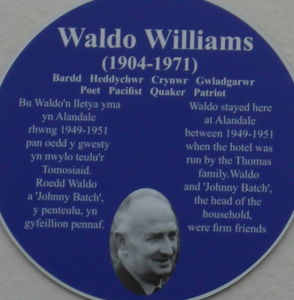
An information board was unveiled at Oriel y Parc by Alun Ifans offering an introduction to the significance of Waldo’s life. And outside Alandale in Nun Street in the city a plaque was unveiled by Ithel Parri-Roberts to note Waldo’s residency there. Anecdotes were shared by the two sisters, Enid and Yvonne, who remembered the unusual lodger well and his strong friendship with their father, Johnny ‘Batch’.
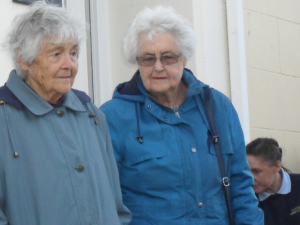 Above: Sisters Enid and Yvonne outside their old home Alendale in Nun Street where Waldo was a lodger for a while. They shared their reminiscences before a plaque was unveiled to denote the friendship between their father Johnny ‘Batch’ and Waldo.
Above: Sisters Enid and Yvonne outside their old home Alendale in Nun Street where Waldo was a lodger for a while. They shared their reminiscences before a plaque was unveiled to denote the friendship between their father Johnny ‘Batch’ and Waldo.
The following morning Carol Owen from the National Park and Hefin Wyn led a walk along the coastal path and around Carn Llidi. Mention was made of the landscape and the references to the area in Waldo’s ode to ‘Tŷ Ddewi’.
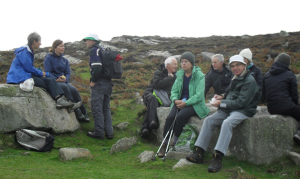
Above: Some of the walkers enjoying a break during the Guided Walk
Llên a Chelf a Llun a Chân
An auction of paintings, poems, songs and opening paragraphs of books raised over £9,000 for Cymdeithas Waldo within a few hours on Saturday morning, November 16.
John ‘Cwmbetws’ Davies was the man with the gavel enticing offers at Ysgol y Frenni, Crymych. And there was strong bidding for some items. A copy of the first edition of ‘Dail Pren’ (1956), with Waldo’s signature for his fellow poet, Idwal Lloyd from Trefin, was sold for over £500.
There were over 150 items for sale and the reasons why they were donated were various and unexpected. Geraint Jarman donated written copies of five of his songs because he remembered Waldo calling at the family home in Cardiff when he was a child. Others of course admired the poet and pacifist’s principled life as they continue to find inspiration in his poems.
Alun Ifans, on behalf of Cymdeithas Waldo, organised and collected all the itmes over a period of several months.
Poems Appreciated
Earlier in the year a remarkable evening was had at Bethel Chapel Vestry, Mynachlog-ddu, on Friday evening, May 3, discussing a select few of Waldo Williams’ poems as seen in the volume ‘Dail Pren’.
The evening was steered by Wyn Owens and Eirian Wyn Lewis, chairman of Cymdeithas Waldo, and national bard, Eirwyn George gave a notable contribution as he enlightened all present as to the meaning and significance of each poem.
Y Sant (The Saint)
The first poem to be dissected was the satirical ‘Y Sant’ which refers to the expected behaviour of a headteacher – he must be teetotal and never be seen in a pub relaxing after a weary week. He must be present in all Sunday services and never use the Sabbath to write letters to friends. He must never criticise anyone and never be criticised by anyone either and live an exemplary virtuous life on the basis of a daily ritual.
Waldo, of course, was a teacher but hardly the type of saint the appointments Committee expected to appoint as headteacher. He had convictions. He composed the poem in 1948.
Ar Weun Cas’Mael (On Puncheston Moor)
The poet’s convictions are well to the fore in the poem ‘Ar Weun Cas’Mael’. He could see that nature’s everlasting guidelines would be a means of vanquishing the temporary squalor, such as the ammunitions factory at Trecŵn, which he saw in his world. He could see society flowering again without any restrictions. There was a great deal of discussion as to whether the natives pronounced Casmael as Cashmâl. There was little evidence.
Preseli
According to Eirwyn George the poem ‘Preseli’ resonated in his heart as he could fully identify with its content. He could explain the various references to the close-knit agricultural community. Neighbours would converse on the farmyard during the day as they got on with their work at the same time but in the evening conversations would be held indoors on the hearth and a sense of community would blossom. The exact location of the ‘Efail’ (Smithy) was mentioned as the smithy at Penrallt and not as sometimes thought a reference to the nearby village of Efail-wen.
Daw’r Wennol yn Ȏl i’w Nyth (The Swallow will Return to her Nest)
A great deal of personal references were heard when discussing the ode ‘Daw’r Wennol yn Ȏl i’w Nyth’ which refers to the rich Castlemartin land been taken over by the Ministry of War. There is as much as 12 inches depth of arable land there compared with about four inches at the most in these areas. “There is nothing as honest as soil” said Eirwyn “ because on giving to the soil there will be a handsome return”.
Lo and behold, one of those present, Anna Williams, Cymdeithas Waldo secretary, was able to relate her family’s history being forced to leave their rented farm Bulliber on the Cawdor Estate to make room for the military in the late 1930s. The significance of the poem was therefore far more poignant.
Eirwyn believed Waldo’s prophecy had to a great extent been realised as the swallow had literally returned to her nest on some of the county’s military sites that have been decommissioned. But he doubted whether there would be any large scale farming ever again on the vast Castlemartin range as it had already been designated as a special scientific site with its myriad of unusual and rare plants.
It was agreed that such a meeting should be held annually. Of the poets present there were several notable National winners such as Mererid Hopwood, Tudur Dylan and Idris Reynolds.
Open Air Service
At the open air religious service held at Waldo’s Stone on July 14 worshippers had travelled from Tumble and the Swansea Valley. Contributions were made by Rev Gareth Morgan Jones and National chaired bard Robat Powel who composed a sonnet for the occasion.
‘Goleuni’r ddinas’
I fab y ddinas, beth yw darllen daear?
Ni ŵyr na medel nac anfeidrol awr
Ar heol hunanoldeb, a’r ceir cynnar
Yn llenwi’r clyw a mygu caniad gwawr.
Nid yw’n adnabod ond ei frys ei hunan,
Y sengi dall ar draws briallu byw
Heb sylwi ar gymydog a’i dro trwstan,
Heb funud fwyn i ddelwi nac i Dduw.
Er hynny, ambell waith, os oedaf ennyd
Ar briffordd ein dieithrwch, gwelaf fry
Oleuni glas yn rholio trwy’r cyfanfyd
I hawlio’r llethrau a’r ystrydoedd du.
Fe leda dydd y weledigaeth fawr
Ei rwydi cyfrin dros holl blant y llawr
Robat Powel 2019
